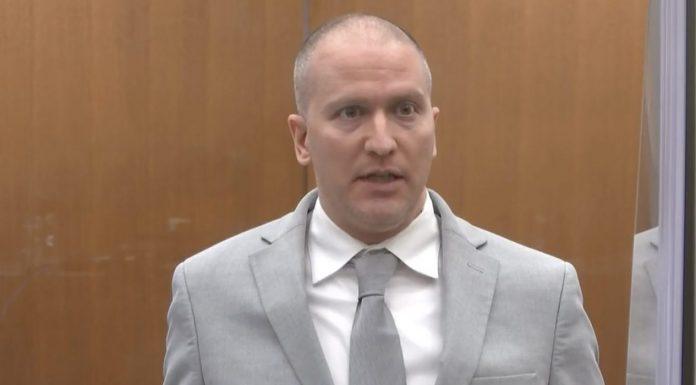(Headline USA) Former Minneapolis police Officer Derek Chauvin was sentenced to 22 and a half years in prison for the murder of George Floyd, whose death last May led to months of race riots and political upheaval.
The punishment—which came after Chauvin broke his yearlong silence to offer condolences to the Floyd family and express his hope that they eventually have “some peace of mind”—is one of the longest prison terms ever imposed on a U.S. police officer acting in the line of duty.
Still, radical anti-police activists were disappointed the sentence wasn’t longer. The penalty fell short of the 30 years prosecutors had requested. And with good behavior, Chauvin, 45, could get out on parole after serving two-thirds of his sentence, or about 15 years.
“Just because it’s the most time doesn’t mean it’s enough time,” said Nekima Levy Armstrong, a Minneapolis protest leader.
In imposing the punishment, Judge Peter Cahill went beyond the 12-and-a-half-year sentence prescribed under state guidelines, citing “your abuse of a position of trust and authority and also the particular cruelty” shown to Floyd.
Floyd family attorney Ben Crump said the family had gotten “some measure of accountability” but is hoping Chauvin gets the maximum sentence at his upcoming federal civil rights trial. Crump said this was the longest sentence a police officer has ever received in Minnesota.
But he added: “Real justice in America will be black men and black women and people of color who will not have to fear being killed by the police just because the color of their skin. That would be real justice.”
Outside the courthouse, a crowd of about 50 people clasped hands or placed them on each other’s shoulders. The reaction was subdued as people debated whether the sentence was long enough. Some cursed in disgust.
At George Floyd Square—as the intersection where Floyd was arrested is now known—members of the crowd broke into applause, and several said, “We’ll take it.”
Chauvin was immediately led back to prison. He showed little emotion when the judge pronounced the sentence. His eyes moved rapidly around the courtroom, his COVID-19 mask obscuring much of his face.
On Friday, Chauvin, who did not testify at his trial, removed his mask and turned toward the Floyd family, speaking only briefly because of what he called “some additional legal matters at hand”—an apparent reference to the federal civil rights trial, where his words could be used against him.
“I do want to give my condolences to the Floyd family. There’s going to be some other information in the future that would be of interest. And I hope things will give you some some peace of mind,” he said without further explanation.
Defense attorney Eric Nelson had asked that Chauvin be let off on probation, saying the former officer’s “brain is littered with what-ifs” from that day: “What if I just did not agree to go in that day? What if things had gone differently? What if I never responded to that call? What if? What if? What if?”
Chauvin’s mother, Carolyn Pawlenty, pleaded for mercy for her son, saying his reputation has been unfairly reduced to that of “an aggressive, heartless and uncaring person.”
“I want this court to know that none of these things are true and that my son is a good man,” she told the judge, adding: “Derek, I want you to know I have always believed in your innocence, and I will never waver from that.”
“I will be here for you when you come home,” she said.
Prosecutor Matthew Frank, in asking the judge to exceed the sentencing guidelines, said “tortured is the right word” for what the officer did to Floyd.
“This is not a momentary gunshot, punch to the face. This is 9½ minutes of cruelty to a man who was helpless and just begging for his life,” Frank said.
Floyd’s family members had tearfully asked the judge to impose the maximum, which was 40 years.
Afterward, Floyd’s nephew Brandon Williams said the sentence was insufficient, “when you think about George being murdered, in cold blood with a knee on his neck for 9 minutes and 29 seconds execution-style in broad daylight.” LaTonya Floyd, George Floyd’s sister, said of the punishment: “That’s nothing. That’s nothing. He should have got the max, period.”
Before the sentencing, the judge denied Chauvin’s request for a new trial. The defense had argued that the intense publicity tainted the jury pool and that the trial should have been moved out of Minneapolis.
The judge also rejected a defense request for a hearing into possible juror misconduct. Nelson had accused a juror of not being candid during jury selection because he didn’t mention his participation in a march last summer, at which he wore a T-shirt supporting the anti-police activist group Black Lives Matter.
Prosecutors claimed the juror had been open about his views but that the question about his past political activity had never arisen.
Philip Stinson, a criminal justice professor at Bowling Green State University, said 11 non-federal law officers, including Chauvin, have been convicted of murder for on-duty deaths since 2005. The penalties for the nine who were sentenced before Chauvin ranged from from six years, nine months, to life behind bars, with the median being 15 years.
Chauvin has been held since his conviction at the state’s maximum-security prison in Oak Park Heights, where he has been kept in a cell by himself for his own protection, his meals brought to him.
The three other officers involved in Floyd’s arrest are scheduled for trial in March on state charges of aiding and abetting both murder and manslaughter. They will also stand trial with Chauvin on the federal charges. No date has been set for that trial.
Adapted from reporting by the Associated Press

